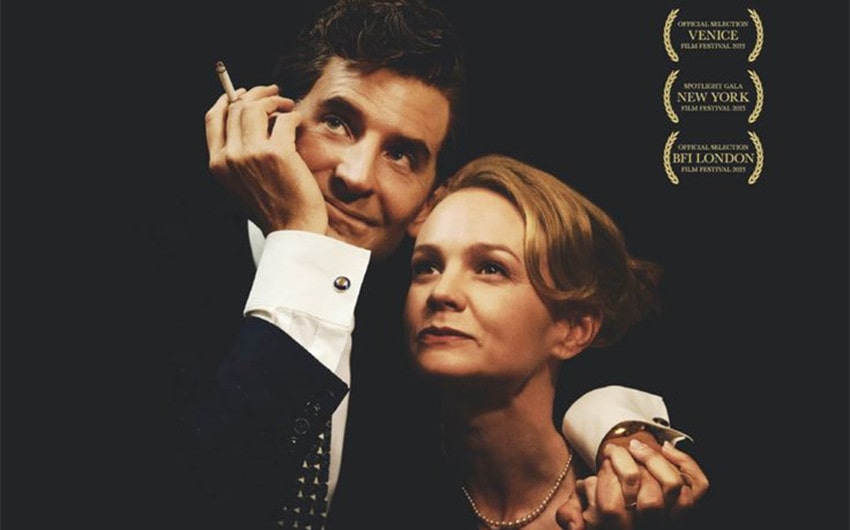Maestro Review: A Deep Dive Into Leonard Bernstein’s Life
Life often feels like a symphony of emotions—love, ambition, and the search for purpose blending into something uniquely ours. Maestro takes this universal experience and paints it on a cinematic canvas, capturing the highs and lows of legendary composer Leonard Bernstein’s life.
With Bradley Cooper at the helm, the film offers a heartfelt exploration of passion, relationships, and legacy. This Maestro review dives into the film’s striking performances, visual brilliance, and the emotional depth that resonates with anyone who’s ever chased a dream or cherished a love story.
Overview of the Plot

Image source: Pinterest
Maestro tells the compelling story of Leonard Bernstein, one of the most iconic composers and conductors of the 20th century. The film explores his life through a delicate balance of his professional achievements and personal struggles, focusing on his complex relationship with his wife, Felicia Montealegre.
Spanning decades, the narrative captures Bernstein’s rise to fame, the challenges of maintaining his creative genius, and the sacrifices that came with it. The storyline doesn’t shy away from the emotional intricacies of love, ambition, and identity, making it an intimate portrayal of a multifaceted legend.
Bradley Cooper as Director and Actor
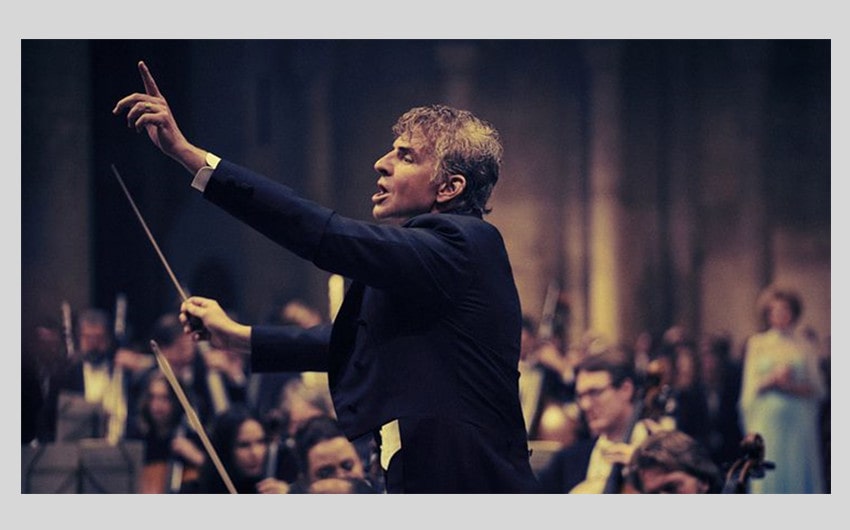
Image source: Pinterest
Bradley Cooper not only stars as Leonard Bernstein but also directs Maestro, showcasing his remarkable versatility. His portrayal of Bernstein is nuanced and deeply human, capturing the composer’s charisma, vulnerability, and internal conflicts with striking authenticity.
Cooper’s directorial vision is equally impressive, blending grand musical moments with quiet, intimate scenes that reveal Bernstein’s private struggles. His commitment to the role is evident in the physical transformation and detailed mannerisms that bring Bernstein to life.
As a director, Cooper skillfully balances the biographical elements with emotional storytelling, creating a film that is as personal as it is cinematic.
Performances of the Supporting Cast
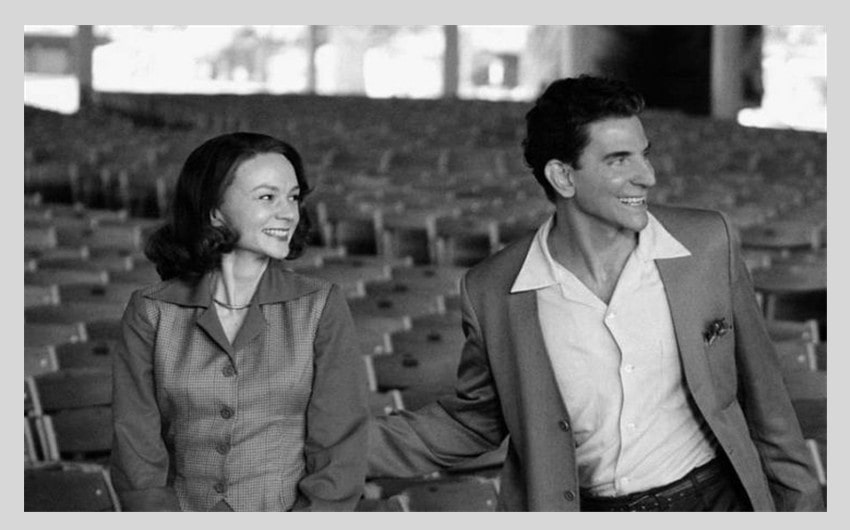
Image source: Pinterest
Carey Mulligan delivers a powerhouse performance as Felicia Montealegre, Bernstein’s wife and an anchor in his tumultuous life. Mulligan captures Felicia’s strength, grace, and the emotional weight of her enduring love for Bernstein, even as their relationship faces challenges.
Her chemistry with Cooper is electric, adding depth to their on-screen partnership. The supporting cast, including notable appearances by Matt Bomer and Maya Hawke, enhances the narrative with subtle, yet impactful performances. Each actor contributes to building a world that feels authentic, elevating the film beyond a standard biopic into a deeply immersive experience.
Visual and Cinematic Excellence
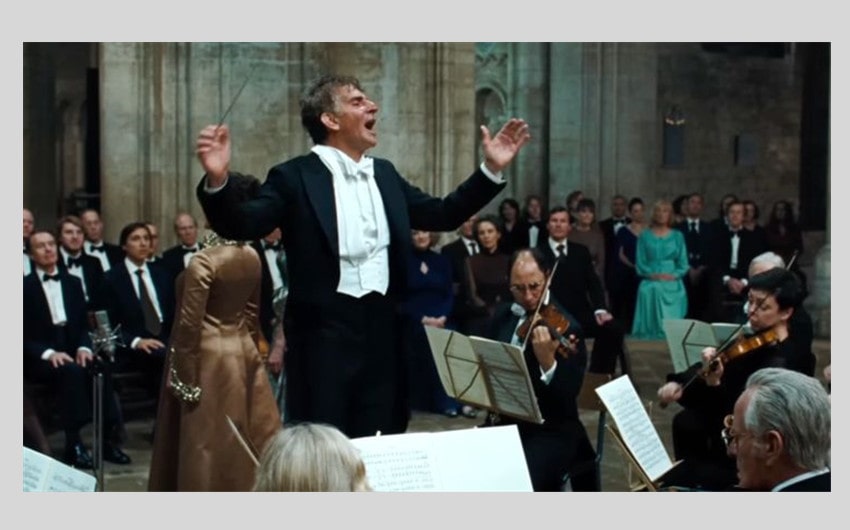
Image source: Pinterest
The visual storytelling in Maestro is nothing short of breathtaking, blending period-accurate aesthetics with an artistic flair that elevates the film’s emotional impact. The cinematography captures the essence of each era in Bernstein’s life, with meticulous attention to detail in the settings, costumes, and color palettes.
Intimate moments are framed with a soft, almost poetic quality, while grand orchestral scenes are shot with sweeping angles that amplify their magnificence. The use of lighting is particularly noteworthy, shifting from warm, golden hues during moments of joy to cooler, muted tones that reflect emotional turmoil.
The film’s visual language creates a seamless narrative flow, pulling the audience into Bernstein’s world and making every scene a visual feast.
Music and Its Role in the Film

Image source: Pinterest
Music serves as the heartbeat of Maestro, not merely as a backdrop but as a driving force in the storytelling. Bernstein’s compositions are woven into the narrative, illustrating his genius and the way music intertwined with every aspect of his life. Iconic pieces like West Side Story resonate deeply in pivotal moments, reflecting his passion and creative struggles.
The original score complements these classical works, enhancing the emotional layers of the film without overshadowing Bernstein’s legacy. Musical sequences are crafted with authenticity, from the precise orchestral movements to the charged atmosphere of the concert halls.
Through its music, the film doesn’t just tell Bernstein’s story—it invites the audience to feel it, turning melodies into a shared emotional journey.
Themes and Emotional Resonance

Image source: Pinterest
At its core, Maestro is a film about the complexities of human connection and the pursuit of creative greatness. It delves into themes of love, ambition, identity, and sacrifice, offering a profound exploration of Leonard Bernstein’s life.
The relationship between Bernstein and his wife, Felicia Montealegre, serves as the emotional anchor of the story, showcasing the delicate balance between devotion and personal fulfillment. The film also tackles issues of self-expression and authenticity, particularly in the context of Bernstein’s personal struggles with his sexuality and societal expectations.
What makes these themes resonate is the universality embedded in Bernstein’s story. Whether it’s the joy of success, the strain of maintaining relationships, or the loneliness that can accompany ambition, Maestro invites viewers to reflect on their own lives. The emotional depth of the film is further heightened by its portrayal of raw, intimate moments that linger long after the credits roll.
Strengths and Weaknesses
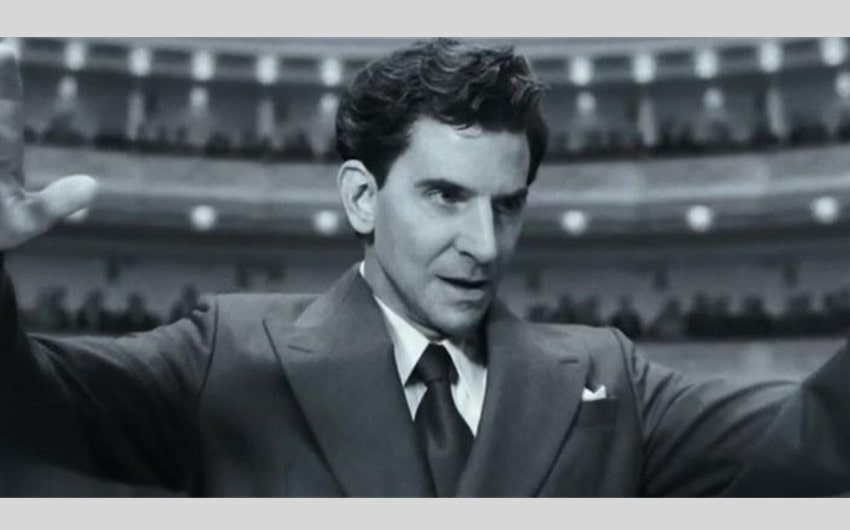
Image source: Pinterest
Strengths
One of the film’s greatest strengths lies in its performances, with Bradley Cooper and Carey Mulligan delivering deeply moving portrayals of Leonard Bernstein and Felicia Montealegre. The chemistry between the leads brings authenticity to the story, making the relationship at the heart of the film feel real and impactful.
The cinematography and production design are equally commendable, immersing the audience in the world of 20th-century music and culture. Cooper’s direction strikes a balance between grandeur and intimacy, ensuring that the emotional core of the film never gets lost in the spectacle.
Additionally, the integration of Bernstein’s music into the narrative is masterful, creating moments of pure cinematic magic.
Weaknesses
While Maestro excels in many areas, it isn’t without its flaws. The film’s pacing can feel uneven at times, with some sections dragging while others rush through critical moments in Bernstein’s life. This uneven rhythm might leave viewers wishing for more depth in certain aspects, such as the exploration of Bernstein’s creative process or his relationships beyond Felicia.
Additionally, the film’s focus on emotional storytelling might not appeal to those looking for a comprehensive, fact-heavy biographical account. For some, the artistic liberties taken in favor of emotional impact could feel like missed opportunities for deeper historical context.
Overall, despite its minor shortcomings, Maestro succeeds in delivering a powerful, moving portrayal of a musical legend’s life.
Featured image: Pinterest.com

